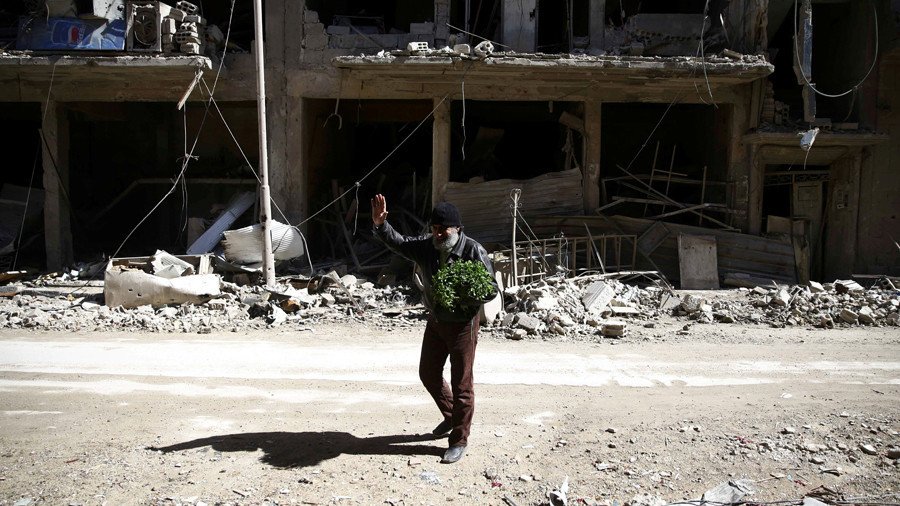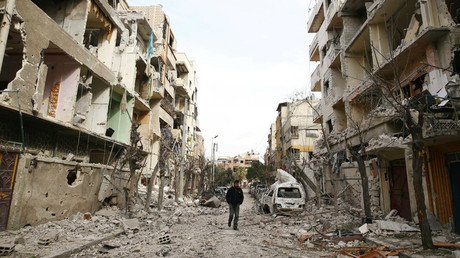All sides should come together for humanitarian purposes in Syria, says specialist attorney Jennifer Breedon. Such an approach is more constructive than taking the US State Department podium to say Russia should have done more.
Shortly after a Russia-sponsored humanitarian pause came into force in Syria’s Eastern Ghouta, the US State Department threw accusations at Moscow and the Syrian government. The US State Department claims Russia isn’t sticking to the UN-backed ceasefire. In Tuesday’s press briefing, spokeswoman Heather Nauert blamed Moscow for continuing to support President Bashar Assad.
“Russia supported the ceasefire. Russia is certainly not adhering to the ceasefire. They’re not adhering to the ceasefire because they continue to sponsor and back [Assad’s] government. That is tragic.”
Jennifer Breedon, an attorney specializing in foreign policy, international law and religious terrorism, commented on the charges Nauert levelled at Russia. Breedon said that we are seeing a continuing pattern of the US State Department trying to find others to blame.
“The truth is the US has actually made a very specific and strategic failure in Syria, and it lost a lot of the ability to speak about that,” she told RT. She went on to say that rather than trying to make this ceasefire work, the US is saying Russia is now in charge of Syria.
In Breedon’s view, this is not up to Russia or any one nation but “it is up to all of the nations that are in Syria to agree to the ceasefire.”
Breedon reiterated that it is unfortunate to see this continued pattern of rather immature behavior on behalf of the US State Department “that is trying to blame Russia or some other power when they really have lost their ability to do anything [in Syria], even if it’s to protect people.”
“Of course, there is an issue that there are some people in Eastern Ghouta that do not want to leave because they are afraid that there are going to lose their foothold. But this has nothing to do with Russia, or with any sort of power that Russia would have on the Assad regime,” she explained.
She added that “if the shelling is going on, that means that the countries like the US, Russia and others [need] to come together and say ‘this is for humanitarian purposes regardless of our sides,’ rather than taking the US State Department podium to say Russia should have done more.”
'We don’t accept blame for humanitarian situation in Syria’ – Russian envoy to UK
Also on Tuesday the British Foreign Office invited Russian Ambassador to the UK Alexander Yakovenko to discuss the humanitarian situation in Eastern Ghouta. During the meeting with FCO Minister of State Alan Duncan, where the key question was the fulfillment of UN Security Council Resolution 2401, Yakovenko expressed his “categorical disagreement with Foreign Secretary Boris Johnson’s recent attempts to put all the responsibility for the humanitarian situation in this area on Russia.”
“We were disappointed with the statements of Secretary Johnson when he spoke yesterday at the parliament and he blamed Russia for the humanitarian situation and we said this directly to minister Duncan,” Yakovenko told RT.
The key point of the discussion though was the situation on the ground in Syria and the implementation of the resolution. He noted that in just two days some 70 strikes were launched from Eastern Ghouta against Damascus, killing 30 people and injuring 200.
“These where the attacks by Jihadists or terrorists, whatever you call them and of course Damascus has to react,” he said. Another problem, the ambassador went on to say, is delivering humanitarian aid to the region.
“The UN is waiting to send the humanitarian aid to Eastern Ghouta, but how to get it there? Because the routes are full of mines, you cannot go there,” Yakovenko explained.
He added that the terrorists are also using people as live shields and not letting them out. According to the ambassador, the Russian and the Syrian sides tried to agree a safe passage for civilians from eastern Ghouta but that attempt “failed.”
During the London meeting, Yakovenko and Duncan discussed “what the British could do in practical terms to support the resolution and what kind of signals they could send to the military opposition, or whatever, to the armed people, in order to save lives.”
Yakovenko described the meeting as a very pragmatic conversation: “Minister Duncan promised to send the right signals to the people with whom they are connecting on the ground in order to have this ceasefire and to fulfill the resolution.”
“We need the British on board, but we don’t accept the statements like ‘the Russians are guilty for the humanitarian situation.’ We are in the same boat. We are trying to do our best in order to release Syria from the terrorists,” the ambassador concluded.


